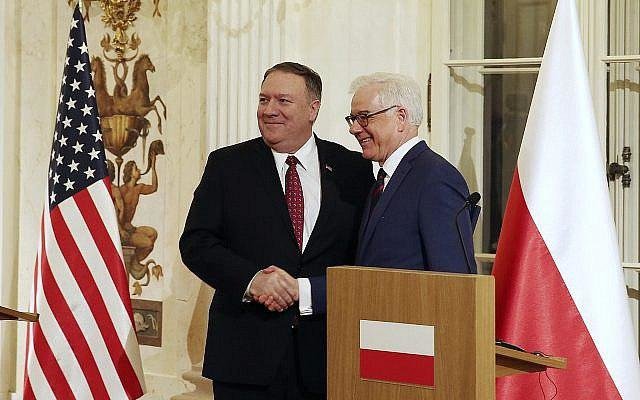TEHRAN - The U.S. is co-hosting a conference on the Middle East with Poland in Warsaw. It has claimed the aim of the conference is to address crises in the region.
It is not difficult to really understand the chief causes of conflicts and instability in this volatile part of the world.
First and foremost, Israel and Washington’s blind support for Tel Aviv have been and will remain to be the main culprits behind the conflicts in the Middle East.
The continuous stealing of the Palestinian lands is not only a violation of international law and the basic rights of an entire nation, it has also radicalized the youth in the regional countries, especially those in the Arab world.
Add to this the transfer of the U.S. embassy from Tel Aviv to Jerusalem al-Quds in violation of international law. This has just added salt to the wound.
Now Israel may boast that it is gradually normalizing ties with certain Arab countries but its continued policy will not help change the minds of the Arabs and other Muslims about the Tel Aviv regime.
The other main reasons behind the problems in the region is Washington’s support for dictators in the Arab world. Donald Trump’s sword dance with Saudi officials who ordered the brutal chopping of Jamal Khashoggi is a concrete example.
While the U.S. claims support for human rights, it is shamefully arming and supporting Saudi Arabia and its coalition partners in their relentless war on fellow Arab nation of Yemen.
Washington is also oblivious to the Shias’ struggle for equal rights in Bahrain and has closed its eyes to the Medieval Age verdicts against political opponents in the country.
There are many other examples to cite.
The other reason for the headaches in the region dates back to the United States’ support for Muslim youth fighting the Soviet Union in Afghanistan in the 1980s. In those days U.S. politicians viewed religious fanaticism as the main bulwark against the Soviets who were viewed as pagans. In fact, officials in Washington fueled religious fanaticism to prevent the influence of the Soviets in the Cold War era.
Later these Muslim youth, chief among them al-Qaeda members who were mostly from Arab countries, turned against their masters and started terrorist activities in the Middle East and other parts of the world.
Add to this the U.S.-British invasion of Iraq in 2003 in violation of international law and repeated warnings by international figures of the time such as Kofi Annan, Jacques Chirac, Gerhard Schröder, Atal Bihari Vajpayee, Nelson Mandela and many other dignitaries.
It is clear to the entire world that the U.S. invasion of Iraq, under the false claim that Saddam Hussein was hiding weapons of mass destruction, not only led to unspeakable suffering for the Iraqi people it also led to spread of terrorism and violence in the region.
Some of those notorious terrorists in Iraq had become battle-hardened in Afghanistan and through their bigoted ideology triggered civil war in Iraq.
When the Arab spring started people who were angry of the rulers and their corrupt systems rose up for a change but, without the exception of Tunisia, the uprisings in the Arab world were misled and struggle for democracy and justice changed their place with terrorism and violence.
Rich Arab nations in the Persian Gulf region were instrumental in misleading pro-democracy movements in order to prevent the spread of uprisings to their countries. Analysts say they transferred money and arms to terrorists in order to convey this message to the people that if they rise against their ruling system they will become another Syria.
Some of those youth who had been trained and fought in Afghanistan and years later committed many terror acts inside Iraq poured into Syria.
Certain Arab countries’ support for radicals to topple the Syrian government, which does not see eye to eye with Washington and its regional allies, was so great that it led to the birth of more terrorist groups such as ISIS who were crueler than al-Qaeda.
If the U.S. did not fan the flames of religious bigotry in Afghanistan in the 1980s and did not invade Iraq, and also if certain Arab countries such as Saudi Arabia did not support radicals in Iraq and Syria today there were not such names as al-Qaeda, ISIS, al-Nusra and some other terrorist groups.
So it is clear that Washington, especially its current administration, does not really seek a peaceful and stable Middle East. If it is really seeking ways to stabilize the region it must rectify its mistakes; stop support for countries such as Saudi Arabia which is the birthplace of the ideology of religious terrorism; pressure Saudi Arabia and the UAE to end their war on Yemen; and more importantly stop supporting Israel which has been acting for decades against all internationally accepted norms and international law.
Though Washington, under European pressure, has been forced to retitle the agenda of the Warsaw conference from demonizing Iran to a focus on peace and security in the Middle East, there is no doubt that Secretary of State Mike Pompeo, National Security Advisor John Bolton, Vice President Mike Pence, and Israeli Prime Minister Benjamin Netanyahu will use the opportunity to vent their personal anger at Iran and say that Iran is the root of the problem.
However, demonization of Iran will not solve any problem so long as this policy continues. The Warsaw conference is in fact a disinformation campaign against Iran. To the surprise of Pompeo and his friends in Israel, Saudi Arabia and the UAE, the disinformation campaign in Warsaw faced a dead end before it started on Wednesday.


No comments:
Post a Comment